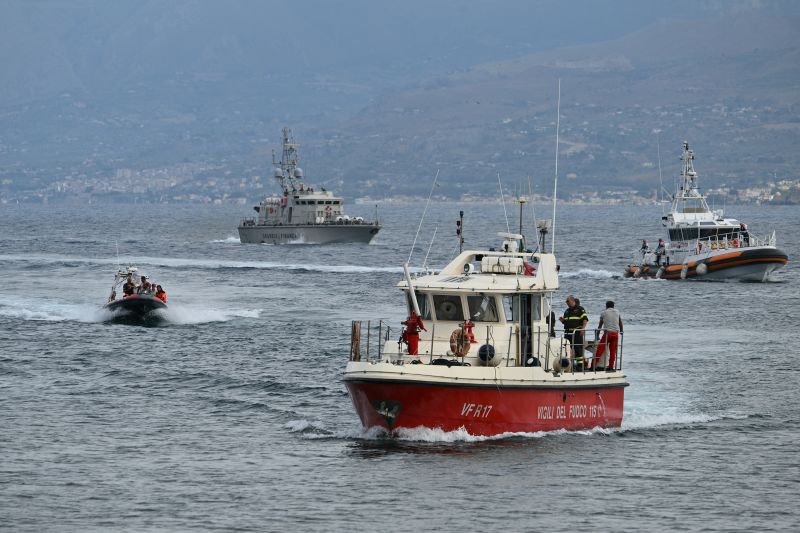More than three months after the $40 million Bayesian superyacht sank off the coast of Sicily, killing seven people including British tech titan Mike Lynch and his 18-year-old daughter, plans to raise the luxury vessel are on the horizon.
And it will cost around $30 million to bring it to shore, according to those who want to manage the complex salvage.
This week, a consortium of insurers led by British Marine, which insure the yacht owned by the Lynch family, presented eight possible salvage plans to the prosecutor’s office in Termini Imerese, near the Porticello fishing port where the yacht went down in bad weather in the early morning of August 19, according to both the consortium and the prosecutor’s office.
The groups that tendered bids for the salvage operation have not been publicly named and are under strict non-disclosure gag orders set by prosecutor Raffaele Cammarano, who is in charge of the preliminary criminal investigation.
The remaining plans all involve rotating the 55.9-meter (184-foot) yacht, which weighs 534 tons, nearly 90 degrees onto the seabed without removing the fuel or dismantling the 72-meter (236-foot) mast.
The wreckage now rests on its right side some 50 meters (164 feet) below sea level, meaning the tip of the mast will stick out above the surface some 22 meters (72 feet) once the yacht is upright on the seabed and before it is lifted out of the water.
Plans vary on how to best raise it once stabilized. Some suggest using a harness system and giant cranes on salvage barges or specially-built piers to lift it, others a buoyancy system similar to what was used to right the Costa Concordia cruise ship. That ship sank off the Tuscan island of Giglio in 2012 and the subsequent marine salvage operation remains the largest and most expensive ever attempted. A buoyancy system would incorporate balloon-like devices that would float the vessel slowly.
Once the Bayesian superyacht is righted on the seabed and lifted to the surface of the water, it will either be towed, carried, or sailed to a secure port depending on the condition of the hull. It will most likely be taken to the nearby port of Palermo, some 8.4 nautical miles away, where it will be sequestered by law enforcement officials who will investigate the cause of the disaster and recover any sensitive data onboard.
Fifteen people survived the accident, including Lynch’s wife Angela Bacares and nine crew members. The ship’s captain, New Zealander James Cutfield, the engineer and a deckhand are all under investigation for manslaughter but have been allowed to leave the country.
The other crew members and passengers were questioned at length in the days after the accident. No formal criminal charges have yet been filed.
The prosecutor Cammarano said that the criminal investigation into culpability will hinge on what investigators find when the ship is brought to shore, including whether doors were left open or improperly secured, or whether a design flaw led to the sinking.
The salvage plans include ensuring that the hull, doors and mast stay intact to aid in the investigation. Bayesian manufacturer Perini Navi has said the yacht was “unsinkable” and blames the captain and his crew for negligence that caused the vessel’s demise.
The superyacht, which was originally named Salute and then renamed after the Bayesian computation theory when Lynch’s family bought it, was kitted out with luxury fixtures and state-of-the-art navigational technology, as well as watertight safes containing what is believed to be highly sensitive data that Lynch always traveled with.
The yacht is insured for around $2.1 billion, according to records filed in Italy, which lists several different insurance companies that covered the ship for liability as well as its engine and hull.
Once the recovery plan has been chosen, the prosecutor’s office will have to sign off on the decision to make sure the salvage plan does not compromise the criminal investigation.
The Italian Coast Guard and Civil Protection agencies, which will secure the port, will also have to approve the salvage plan, which is expected to begin in mid to late January and wrap up by February. After the physical investigation of the vessel, the prosecutor will determine whether any manslaughter or other charges are filed.

